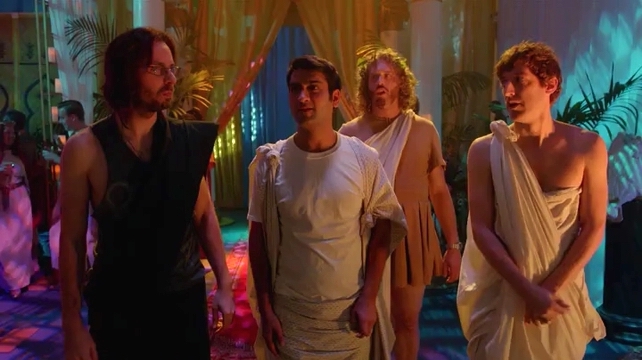Books & Culture
The Tech World Is So Embarrassing
"Uncanny Valley" highlights the way tech companies hide their evil under a thick protective layer of corniness

Working the door at a San Francisco bar in the early 2010s, a friend of mine turned away a newly-transplanted tech entrepreneur for not having an I.D. Surprised but self-assured, the man proceeded to pull out a smartphone and show his Wikipedia page, which included his photo, date of birth, and net worth. Surely, he thought, that would get him in.
When I told this same friend about Anna Wiener’s Uncanny Valley, a first-hand account of Silicon Valley startup culture, he didn’t think he could read it. Too depressing, he said. He grew up in San Francisco—it was difficult enough seeing the city transformed by the presence of the tech industry. Like so many other people, he can longer afford to live there. His home has drastically changed and, for good reason, he didn’t really want to read a book about it.
Wiener’s cautionary memoir does highlight the invasion and occupation of the Bay Area by tech startups and established giants, and it draws attention to the fundamental sociopathy of both the companies and the individuals involved. But Silicon Valley’s general evilness is a fact so well-established at this point that we have grown weary of grappling with it, collectively adopting a resigned sense of inevitability in exchange for convenience and connection. Where Uncanny Valley distinguishes itself is in providing an insider’s perspective of the cringiness of tech mores and the tacky sense of self-entitlement that pervades the milieu, casting light on a culture marked by a recurrent corniness and stupidity that often belies its pernicious nature.
A narrative of internet-as-nightmare that takes place largely in meatspace, in open-plan offices where hoverboards and sexual harassment go hand in hand, Wiener recounts her life as a twentysomething female working in the overwhelmingly male-dominated world of tech. The author details leaving Brooklyn—where she worked in the publishing industry—and relocating to San Francisco to work for an analytics startup. She describes a city overrun by young, freshly-minted millionaires—predominantly white and male—who proselytize on the merits of biohacking and unironically wear company t-shirts to parties.
Silicon Valley’s evilness is so well-established that we’ve adopted a resigned sense of inevitability in exchange for convenience and connection.
As a chronicle of late capitalist absurdity, Uncanny Valley corroborates various accounts of the Bay Area’s transformation. Last year’s Super Pumped, Mike Isaac’s deep dive into the turbulent history of Uber, detailed the batshit world of Silicon Valley tech bros, venture capital, and reckless disruption. Popular films like Sorry To Bother You, Blindspotting, and The Last Black Man In San Francisco all speak to the gentrification brought on by the tech industry. This past November, a group of mothers took over a vacant investor owned property in West Oakland. “This came out of absolute desperation,” one of the group’s members said in an interview. “These are the times we’re living in where your only option is to occupy a house or live with your children on the street.” When they were recently evicted, a SWAT team broke through the front door with a battering ram before dawn and arrested four of the women.
Wiener documents an entirely different way of life taking over the Bay Area, exclusive to young, upwardly mobile tech workers. It’s a world of open bar team-building meetups with carnival games, followed by citywide scavenger hunts that involve running through the streets and stumbling over homeless people. “We were our own worst representatives,” she writes.
“An entire culture had been seduced,” notes Wiener of her time in tech. “I understood my blind faith in ambitious, aggressive, arrogant young men from America’s soft suburbs as personal pathology, but it wasn’t personal at all. It had become a global affliction.”
Naive sentimentalism, whether feigned or genuine, is the preferred smokescreen of some of tech’s worst offenders. Think of Twitter’s CEO Jake Dorsey, a young, white man sitting at the helm of one of the world’s largest social media platforms, meditating in a cave while incidentally promoting a country actively engaged in ethnic cleansing. Consider the platform itself and others like it, the intentionally addictive, gamified design and the infinite scroll, creating what Wiener calls, “a cultural impulse to fill all spare with someone else’s thoughts.”
“I know it sounds corny, but I’d love to improve people’s lives, especially socially,” Mark Zuckerberg said in the early days of Facebook. This disingenuous sentiment (Facebook’s predecessor was FaceMash, a website Zuckerberg created that placed two pictures of women side by side and allowed users to judge who they found more attractive) gave way to the “move fast and break things” era. Facebook, bitterly referred to by Wiener as “a social network everyone said they hated but no one could stop logging in to,” is now used by a quarter of the world’s population. Following the Cambridge Analytica data scandal, Zuckerberg said, “I started this place. I run it. And I am responsible for what happens here,” a statement that would implicate him not only in the harvesting of user’s personal data for political advertising, but also in destabilizing traditional news organizations and platforming Holocaust deniers, the latter of which he once excused by claiming, “I don’t believe that our platform should take that down because I think there are things that different people get wrong.” At the company’s annual F8 conference last year, Zuckerbeg tried (and failed) to deliver a joke about some of the company’s recent controversies, awkwardly smiling as he told the audience, “I know we don’t exactly have the strongest reputation on privacy right now, to put it lightly.” In another recent embarrassing moment, Zuckerberg responded to questioning from a congressional committee regarding whether he would allow fake political ads to appear on his platform by stating, “I think lying is bad.”
Uncanny Valley provides an insider’s perspective on a culture marked by a recurrent corniness and stupidity that often belies its pernicious nature.
In a scene reminiscent of the heavily memed footage from the Windows 95 launch—where a young Bill Gates, at the very forefront of the consumer internet and on his way to becoming one of the richest people in the world, guilelessly claps and dances on stage—Wiener begins her book with Zuckerberg ringing the Nasdaq opening bell. It’s a moment that is now preserved on Youtube, showing the then 28-year-old Facebook CEO wearing a coprophagous grin while surrounded by a throng of credulous tech workers enthusiastically rooting him on as he does the deed over video chat from corporate headquarters in Menlo Park, California. That inane events mark major cultural and economic shifts in the era of tech suggests that the framework of late capitalism relies on a certain degree of nonsense to succeed.
In an infamous round of layoffs last year, hundreds of WeWork staff members were fired and then regaled with tequila as one half of Run-DMC joined the all-hands meeting to perform the group’s 1980’s hit “It’s Tricky.” In another round of firings this past November, 2,400 employees were let go after a failed IPO and the resignation of Neumann, who co-founded the tech-adjacent real-estate company after his original idea to sell baby clothes with built-in kneepads failed. Miguel McKelvey, another WeWork co-founder, recently listed his $21 million Brooklyn townhouse for sale, including in his pictures of the home a large framed artwork that reads in a boldface font “I WANT TO CUM IN YOUR HEART.” McKelvey serves as chief culture officer of WeWork, which employs “Operationalize Love” as one of the company’s internal slogans.
The online lodging marketplace Airbnb was co-founded in San Francisco by Brian Cheskey, a bodybuilder-turned-billionaire entrepreneur. Cheskey likes to cite his company’s humble origins—air mattresses set up in his apartment and listed online because he “couldn’t pay rent.” He’s also recounted receiving $150 million from Peter Thiel, the billionaire venture capitalist and Facebook board member who bankrolled Hulk Hogan’s Gawker lawsuit and served on Trump’s transition team. Utilizing a type of facile idealism fueled by tech hubris, Cheskey wrote in 2018, “A company’s purpose is to advance its vision, and since a vision is a mountaintop you never quite get to, you should have an infinite time horizon.” Alas, jargon does not subvert disaster. Last year, a mass shooting occurred at an Airbnb in Orinda, California, leaving five people dead and drawing intense scrutiny of the company’s virtually nonexistent safety policies. The company has also been widely criticized for engendering fraud, racism, and discrimination against people with disabilities, as well as exacerbating affordable housing crises globally. “Belong Anywhere” is the company’s slogan.
Short of total fatalism, Uncanny Valley could encourage readers to take a hard look at technology and our relationships to it.
It’s a bit bewildering to consider the role popular digital platforms play in shaping our lives and the permateen megalomaniacs behind them. Uncanny Valley’s portrayal of a world where the work-life balance is so skewed that companies become major components of workers’ identities should sound the alarm for anyone hoping to stymie the technocapitalist onslaught aimed at monetizing every aspect of our lives. As a tech worker immersed in Silicon Valley culture, Wiener was a small part of the large push to further digital dependency and the myth of a better life lived through data. Her narrative is one of isolation, complicity, and guilt— of life lived within a relatively comfortable tech bubble by-and-large detached from the precarity it’s advancing. “I knew, even then, that I would regret it,” she admits.
“We didn’t think of ourselves as participating in the surveillance economy,” writes Wiener. “We certainly weren’t thinking about our role in facilitating and normalizing the creation of unregulated, privately held databases on human behavior… We were just helping developers make better apps.”
In the words of one privacy professor, “We’re all screwed.” But short of total fatalism, Uncanny Valley could encourage readers to take a hard look at technology and our relationships to it. Our experiences of the world and our understanding of our place in it has been indelibly altered, and we’re still trying to figure out what exactly that means for the future. A collective obsession with connectivity has worn away at the interstice between real life and online, making it increasingly difficult to argue that one is not the other. In an uncanny way, the world of tech has become interminable, and we’ve all become workers for it.









